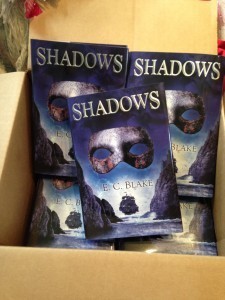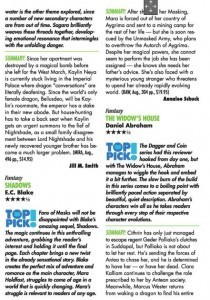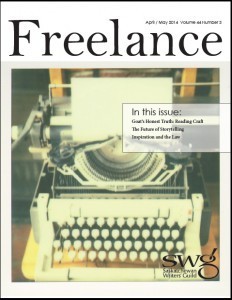E.C. Blake's Blog, page 9
July 23, 2014
Copies of Shadows arrive! Release date is just around the corner…
 Look what I got in the mail today…coming to a bookstore near you August 5!
Look what I got in the mail today…coming to a bookstore near you August 5!
Here’s the copy from the front flap:
In Masks , the first novel in The Masks of Aygrima , Mara Holdfast’s life changed forever. As the daughter of the Autarch’s Master Maskmaker, she had a clearly defined future: working with her father to make the Masks that must be worn by all adults–Masks imbued with a magic that would reveal any treasonous thought about the ruling Autarch. But when her own Mask cracked and fell to pieces during her Masking ceremony, Mara was exiled from everything she once knew. Rescued by an underground rebel group known as the unMasked Army, Mara was recruited to their cause when she learned the shocking truth about the Autarch’s reign. In a moment of crisis, Mara drew upon a volatile magical talent neither she nor her allies could understand or control.
In Shadows , Mara faces staggering new challenges as she struggles to master her terrifying, almost addictive ability to use all types of magic–and to rip magic from those around her to fuel her power.
When Chell, a young man from across the sea, is shipwrecked and washed ashore outside the rebels’ hidden base, it signals the first contact in centuries with the world beyond the borders of the Autarchy of Aygrima. But whether Chell and his people will help the unMasked Army or betray them to the Autarch is very much in question. His arrival, and Mara’s own need for answers that can only be found in the capital city of Tamita, sparks a covert mission to the seat of the Autarch’s power. It is there that an act of unspeakable brutality tips Mara dangerously close to madness…and in the midst of a desperate and bloody battle, she discovers just how horrifying her power can be…
July 5, 2014
Twist of the Blade web page goes live at Coteau Books
 Coteau Books has a great website with pages for all of their books…and the page for Book 2 of my Edward Willett-penned YA fantasy series The Shards of Excalibur, Twist of the Blade, is now live! You can download a high-res version of the cover art and pre-order the print or ebook version right from that page.
Coteau Books has a great website with pages for all of their books…and the page for Book 2 of my Edward Willett-penned YA fantasy series The Shards of Excalibur, Twist of the Blade, is now live! You can download a high-res version of the cover art and pre-order the print or ebook version right from that page.
Here’s the description:
Having saved the first Shard of the sword Excalibur from internet mogul Rex Major (aka Merlin), Ariane and Wally are on the lookout for the second. Wally’s worried that the power of the first Shard is already changing Ariane, giving her the strength to do both good and evil…and when she seriously hurts his bullying sister Flish, it seems he might be right.
Twist of the Blade releases to the public on September 15…just in time for my appearance at Word on the Street in Saskatoon! And, of course, just six weeks after the release of Shadows, Book 2 in the Masks of Aygrima.
June 30, 2014
Read the first two chapters of Shadows
 A month ago I posted the first chapter of Shadows, the second book in The Masks of Aygrima. Now we’re just about a month from the actual release of the novel, and so, as promised, I’ve posted a second chapter.
A month ago I posted the first chapter of Shadows, the second book in The Masks of Aygrima. Now we’re just about a month from the actual release of the novel, and so, as promised, I’ve posted a second chapter.
You can read the first two chapters of Shadows here.
Watch for a chance to win an autographed copy of the novel, coming as soon as I have some copies to offer…
June 27, 2014
Read my YA science fiction novel Andy Nebula: Interstellar Rock Star for free!
My daughter Alice (newly fledged teenager) is a big fan of Wattpad, and has begun posting her own writing there (alicehasreadit is her account, and trust me, the kid’s got promise). I’ve poked around at it and thought it might be an interesting place to try to snare a few new readers, so by way of giving it a go, I’ve created an account (EdwardWillett) and have begun serializing Andy Nebula: interstellar Rock Star:
If you need incentive, check out this recent review on Amazon from Hard Sci-Fi Guy:
“I was expecting this book to be a tongue in cheek novel about a bunch of weird aliens and, instead, the author gave me a great story with a plot that me wondering how it would turn out. Definitely give it a try.”
Heed his advice!
June 17, 2014
Shadows is an August Top Pick in Fantasy by RT Book Reviews
 RT Book Reviews Magazine has named Shadows one of its “Top Picks” in Fantasy for August, with a glowing 4 1/2-star review (the same rating given to Masks, which was also shortlisted for Best Fantasy Novel of 2013 in the RT Book Reviews Reviewers’ Choice Awards).
RT Book Reviews Magazine has named Shadows one of its “Top Picks” in Fantasy for August, with a glowing 4 1/2-star review (the same rating given to Masks, which was also shortlisted for Best Fantasy Novel of 2013 in the RT Book Reviews Reviewers’ Choice Awards).
The review isn’t online yet (although as you can see, I have a copy forwarded to me by my Penguin publicist), but I couldn’t be happier with it. Written by Annalee Schuck, it says:
“Fans of Masks will not be disappointed with Blake’s amazing sequel, Shadows. The magic continues in this enthralling adventure, grabbing the readers’ interest and holding it until th final page. Each chapter brings a new twist in the already sensational story. Blake creates the perfect mix of adventure and romance as the main character, Mara Holdfast, struggles to come of age in a world that is quickly changing. Mara’s struggle is relevant to readers of any age.”
Nice!
Shadows comes out on August 5.
May 25, 2014
Chapter One of Shadows!
 Shadows, the sequel to Masks, will be released on August 5. That’s just a little over two months from now, so I thought I’d whet your appetite with a bit of a teaser.
Shadows, the sequel to Masks, will be released on August 5. That’s just a little over two months from now, so I thought I’d whet your appetite with a bit of a teaser.
Here’s Chapter 1 of Shadows, “The Stranger from the Sea.” When we’re a month out, I’ll add Chapter 2. And also watch for a great giveaway!
Enjoy…
***
SHADOWS
By E.C. Blake
Chapter 1: The Stranger from the Sea
THE MASK GLEAMED WHITE against the dark surface of Mara’s workbench, like a pearl in an ebony box. It looked perfect, priceless, a masterwork of the Maskmaker’s craft . . .
. . . and it was completely, totally, fatally wrong.
“It looks good,” Prella said from behind her. The other girl, the same age as Mara— fifteen—but smaller, had taken to spending all her free time hanging around Mara, ever since Mara had saved her life by healing her with magic after she’d suffered a terrible injury. Mara understood that, and ordinarily was rather touched by it, but she would have been just as happy not to have a witness to her repeated failures.
Like this one. “It isn’t,” she growled. “Watch.” She reached out and poked the Mask’s gleaming cheek. As though her touch had infected the shining face with some terrible disease, the Mask cracked at that point . . . and kept on cracking, a spiderweb of black lines spreading out across all of the shining surface, until the entire Mask abruptly fell apart into dust and flinders.
Prella gasped. “Oh!”
Mara gazed glumly at the ruined Mask. She didn’t even swear . . . this time. She’d used up her entire vocabulary of obscenities (of which a childhood spent playing in the streets of Tamita had given her a surprising number) the first . . . what? twelve times? . . . something similar had happened. Although at least this one had looked like a Mask. The first half-dozen had looked more like something intended to frighten small children.
She lifted her gaze from the crumbled clay and stared out through the narrow slit of the window cut through the rock wall above the bench. Her work chamber was on the topmost level of the Secret City, a long climb from the Broad Way that ran from the main entrance down to the underground lake that was the City’s source of water. From up here, she looked straight across the big horseshoe of the cove into whose walls the City was carved, all the way to the cliff on the far side. Snow glistened on the trees that capped it, white as the failed Mask had been before it crumbled.
Six weeks had passed since she had returned to the Secret City from the disastrous attempt to rescue her friend Katia from the terrible mining camp to which the unMasked were exiled. Six weeks since she had discovered her ability to harness enormous amounts of magic, and to draw that magic, not from the stores of it painstakingly collected from the black lodestone to which it was drawn when living things died, but directly from other human beings. Six weeks since she had ripped magic from scores of people—men, women, boys, girls, Masked and unMasked alike—and contained the force of an explosion that should have leveled the mining camp and killed everyone aboveground within it.
Six weeks since she had discovered that she had the rare form of the Gift that had produced the greatest monsters in the history of Aygrima. . . .the same Gift, but to a far greater degree, than the Autarch himself, the tyrant to whose overthrow the unMasked Army dwelling in this Secret City was devoted.
She rubbed her tired eyes. “And a fat lot of good all that power is doing me right now,” she muttered.
“You’ll figure it out,” Prella said, and Mara started. She’d momentarily forgotten the other girl was there.
“I hope you’re right,” she said. She tried to give Prella a smile. It wasn’t very successful.
She looked down at the crumbled Mask once more. Growing up, she had watched her father, Charlton Holdfast, Master Maskmaker of Aygrima, make many, many Masks. She knew how to shape the clay, how to fire it, how to do everything except for one little thing . . . how to infuse the Mask with magic.
Catilla, the elderly woman who had founded and still commanded the unMasked Army, had seen no difficulty with that little fact when she had kidnapped—rescued, Mara reminded herself—Mara and four others who had just turned fifteen from the wagons taking them to the mining camp in the wake of their failed Maskings. Catilla didn’t want real Masks, Masks that would reveal any traitorous leanings on the part of their wearers to the Autarch’s ever-present Watchers, Masks that would shatter completely if the magic within them judged that the wearer posed a threat to the Autarch’s rule.
She wanted even less the new Masks, those made within the last year or two, which not only revealed incipient sedition but allowed the Autarch to draw magic out of the Masks’ wearers for his own use, a process which also weakened the wearer’s will to the point where he or she literally could not conceive of any rebellion against the Autarch. As a side effect, the new Masks altered the personalities of those wearing them, making them almost unrecognizable to their friends and loved ones. But what was that to the Autarch, desperate for more and more magic to stave off the ravages of old age and keep himself firmly in control?
All Catilla wanted were believable semblances of real Masks, Masks that her followers could wear as disguises, enabling them to safely enter the towns and villages of Aygrima, and even Tamita itself, to . . .
To what? Mara asked herself, not for the first time, and, also not for the first time, had no answer. Catilla had not confided in her what she
intended her followers to do once they could enter those towns and villages.
But then, it doesn’t really matter, does it? Mara thought, still looking down at the failed Mask. I can’t make the counterfeits she wants.
The Mask in front of her should have been nothing but inert clay. She had put no magic into it—he had none, without reaching into the bodies of those around her. And since she had almost killed those whom she had treated as her personal storehouses of magic before, including her friend Keltan, she wasn’t about to do it again.
No matter how tempting it was . . . which it was; despite the agony she had felt when she’d stripped magic from living people, despite the warnings of Ethelda, the Palace Healer who now dwelt in the Secret City and had been tutoring Mara in the knowledge of magic (though not in its use, since the Secret City had no store of it with which to practice), despite the soul-sapping, nightmarish images of those she had killed with magic that had driven her to the edge of ending her own life before she had Healed Prella.
That act of Healing had somehow eased the nightmares, as if it had salved some internal injury she had done herself through her use of others’ magic. Ethelda had warned her, though, that those horrors were not gone from her mind: her power meant that every person she killed with magic, or even those who simply died in her presence, imprinted themselves on her, their final agonies mingling with her own imagination to produce hallucinatory horrors that could threaten her sanity if fully unleashed.
She knew all that. She knew it. And yet . . .
. . . and yet, despite it all, she longed to touch that raw power again, to see what else she could do with it.
She could feel the magic inside Prella’s skinny little body. It would be so easy to reach out and tug it to herself, use it to try to make the next Mask succeed where all the previous attempts had failed. Prella might not even notice what she had done, if she was—
No! She clenched her fists. No. Keltan had been unconscious for hours
after she had sucked him dry of magic that night in the camp. It had taken him days . . . weeks . . . to recover fully.
I will not do it, she told herself. I will not.
It wasn’t the first time she had made herself that promise, and so far, she had kept it.
So far.
She shoved the thought aside, hard, like an annoying branch on a forest path. In any event, she had put no magic into this Mask, or any of her previous attempts: and that, apparently, was the problem.
She had very carefully left out the “recipe,” as her father had called it, the black lodestone dust, infused with magic, which the law required each Maskmaker to include in every Mask he or she made. That “recipe” infused the Masks with their traitor-detecting, and more recently Autarch-feeding, capabilities. Without it, she had thought the Mask clay was perfectly ordinary.
But clearly it wasn’t. The clay the Maskmakers shaped into Masks also came from the Palace . . . and though she could shape it and fire it in the Secret City’s own kilns, used by their own potters to make ordinary pots and plates, and though it always looked, when she drew it out, as though it had fired successfully, one touch, and . . .
. . . that. She stared down at the remnants of her latest failure for another long moment. Of course she’d known that making real Masks required magic from the Maskmaker. What she hadn’t realized was that that magic was required simply to keep the Mask from falling apart. And she had no idea how to use her magic to accomplish that, nor any magic she dared draw on to attempt it.
She sighed and swept the ruined Mask into a dustbin, where the dust and shards of her previous three attempts still rested. “Are you going to try again?” Prella asked.
“I don’t think I can,” Mara said dully. “I’m almost out of clay.” She crossed the small chamber to a chest in the corner, Prella trailing her. She lifted the chest’s lid, revealing a smallish lump wrapped in wet sackcloth,
all that remained of the clay she had been provided by the unMasked Army, which had raided (and then burned to cover their tracks) the Maskmaker’s shop in the nearest village, Stony Beach. “I can’t make more than three Masks out of that.”
“But surely you’ll figure out—”
“I already have figured it out,” Mara snapped, suddenly annoyed beyond reason. “Don’t you get it? I can’t do what Catilla wants me to do. And you and your stupid questions and your stupid chatter and your whole stupid always being there, joggling my elbow, isn’t helping. Go away!”
Prella’s eyes widened, her lip trembled, and Mara had an instant to feel terrible before the smaller girl turned and ran from the workroom, slamming the door behind her.
Great, Mara thought. Just great. She felt like she’d kicked a puppy. I’m a failure as a Maskmaker and a friend.
She sighed. I’d better go apologize. And then I’m going to have to face Catilla. I’m going to have to tell her I can’t do what she wants me to do. What she rescued me to do. What people have died for so I can do.
She felt sick.
She slammed the chest shut, then raised her eyes to the wooden shelf above it. Three clay faces stared back at her, blank eyeholes and mouth openings filled only by the shadows behind them. As sculptures, they were rather good, she thought. But as Masks, they failed utterly. Made of ordinary clay, they were monstrously heavy, whereas a true Mask felt light as a feather on the face. And a true Mask also simply clung, clearly another function of the magic within that accursed special clay, or the magic provided by the Maskmaker. The fake Masks could not be held onto a face without an elaborate system of leather straps. It seemed to Mara that she had somehow managed to carve disappointment and reproach into the expressions of each one.
Prella, she thought again. Catilla.
But at that moment, she didn’t think she could face either. Or anyone else: not Alita, or Simona or Kirika, the other girls rescued from the wagons along with her; not Keltan, whom she had met in Tamita, who had fled the city rather than be Masked, and who had almost died when she pulled magic from him; and definitely not Hyram, great- randson of Catilla, whose father, Edrik, was second-in-command. Alita would be contemptuous, Simona uninterested, Kirika sullen, Keltan and Hyram would fall all over themselves trying to outdo each other in compassion, and none of it would change anything.
She had failed. All she really wanted was to be alone, and she knew just where to go to achieve that.
Her fur-lined leather coat hung on a peg by the door; she grabbed it and left her workroom. Beyond the door a corridor ran left and right, parallel to the cliff face. Other doors led to other workshops—those of the blacksmith and the regular potters, a few others—all located on the topmost level of the Secret City for the simple reason that they all needed fires and the smoke from those fires could be most easily vented through cracks in the ground at the top of the cliff. Mara had worried that that smoke, and all the other smoke from the heating and cooking fires down below, might lead Watchers to the City, but Hyram had explained that the many hot springs in the area (like the one that heated the women’s bathing area in the underground lake) vented steam through similar cracks scattered over a wide area. From a distance, there was nothing to distinguish the smoke of the Secret City from the natural vapors of the landscape. “Provided they don’t get close enough to smell the smoke,” he’d added. “And nobody will get that close without one of the patrols seeing them.”
Mara knew that down the corridor to her left stairs led up to the “back door,” a concealed entrance through which foot patrols came and went, but she turned right and instead took the stairs down. The next two levels of the Secret City were mostly living quarters, including, on the lower of the two, the room where she slept with Kirika, Prella, Alita, and Simona. From there, the stairs led straight down to the Broad Way.
Everyone was busy with their various chores and tasks, or on patrol, and so she met no one during her descent. A young man coming up the Broad Way with a bag of grain slung over his shoulder nodded to her as he passed; a moment later an identical copy of him passed her in the other direction and did the same. “Hi,” she said to each of them in turn. She’d known them for weeks, and they’d been part of the disastrous rescue attempt at the mining camp, and she still couldn’t tell Skrit apart from Skrat.
Skrit/Skrat turned into the Great Chamber, taking his grain to the kitchens, but she pulled on her coat, tugged on the hat and gloves she took from its pockets, and hurried out into the bright cold afternoon.
The days had grown shorter and shorter over the past few weeks, until now, though it was only about four hours past noon, the sun was already dipping toward the horizon, casting long blue shadows on the snowdrifts, crisscrossed by trampled paths, that filled the cove. In ten days it would be Midwinter. Just a year ago she had celebrated it with her parents, their home alight with candles and hung with evergreen boughs. She could still remember how their fragrance had mingled with the delicious smells of cooking ham and baking cakes, how everything had felt beautiful and warm and safe. This year . . .
This year, there seemed little to celebrate, even if the unMasked Army marked the day. So far she’d seen no sign of it.
The ocean thundered, tall breakers racing in to batter themselves into white spray against the stony shore, the sea still unsettled from a violent storm that had blown through the night before. Mara, seeing the height of the waves, hesitated; in storms the water sometimes reached the path along the beach she meant to travel. But she decided to walk down to the water’s edge at least, and once there, looking north, she saw that the path was open. Must be low tide, she thought, for though the water roared against the shore, only the occasional blast of spray made it as far as the cliff face.
The path looked grim, gray, cold, and lonely.
Perfect, Mara thought, and set out along it.
Her feet crunched over the salt-rotted ice covering the sand-and-pebbles beach. Just before the curve of cliff face hid it from her, she glanced back at the Secret City. Two dark figures trudged across the open space, presumably heading to the Broad Way from the stables carved into the base of the cove’s northern cliff. She recognized them instantly as Keltan and Hyram, but they had their backs to her and didn’t see her . . . which suited her fine.
Ten more steps and they, and the cove, were lost to sight. Alone with her thoughts, she wended her way north along the narrow strip of land between the pounding waves to her left and the gray stone cliff to her right, past the entrance to the mine from which the Secret City drew the gold it occasionally used to purchase goods in the villages via children too young to be Masked.
I can’t make the Masks Catilla wants, she thought again as she walked. Spray touched her face. She licked salt from her lips, but lowered her head and trudged on, her breath forming white clouds, the crunch of her footsteps echoing from the cliff to her right. I don’t know how. I need to talk to someone who knows more. I need to talk to . . .
Her thoughts and her feet stumbled. She caught herself with a hand on an ice- oated outcropping of gray stone.
I need to talk to my father.
Her father had deliberately sent her into exile. At great risk to himself—uncertain if his own Mask, modified though it was, might reveal his betrayal to the Watchers—he had crafted her Mask to fail at her Masking on her fifteenth birthday . . . and then had sent word to the unMasked Army that someone with the ability to make Masks would be in the next wagonload of unMasked children sent north from Tamita to the mining camp.
Father must have known I couldn’t really make counterfeit Masks, Mara thought. Which means he lied to the unMasked Army, tricking Catilla into saving me.
But now that lie was unraveling. With the stolen Maskmaker’s clay all but gone, she could hide the truth no longer. She would have to tell Catilla that she could not provide her with the counterfeit Masks she needed.
Unless Mara could talk to her father.
She wanted that; wanted it so much that she wondered for a moment if she had subconsciously made her Masks fail. Of course not, she told herself: but having wondered it herself, even for a moment, she knew there was little doubt Catilla would ask her about it point—blank.
No, she thought. I did everything I could. I did. I just don’t have the knowledge . . . or the magic. Catilla will have to see that. She’ll have to. And then she’ll have to figure out some way for me to go back to Tamita . . . some way for me to see my father again. She’ll have to.
Won’t she?
Mara stopped her northward wandering and wiped water from her cheeks. She told herself it was spray from the sea . . . but it was warm.
She looked around. She’d gone past the narrow defile in the cliff that, providing the only access up from the beach for horses, led to the Secret City’s grain fields and pastures. She’d never walked any farther. The cliff curved out to sea in front of her, and the beach narrowed, so that at the tip of the headland the waves appeared to be crashing across it. Time to head back, she thought. Time to face Catilla.
She tugged her rabbit-skin hat tighter onto her head, shrugged her coat more firmly into place, started to turn . . .
. . . and then froze as a stranger came around the shoulder of the cliff.
May 13, 2014
Song of the Sword, Book 1 in my OTHER fantasy series, is now in print!
Got this handsome box of books from Coteau Books yesterday: copies of Song of the Sword, Book 1 of my five-book The Shards of Excalibur series, written as Edward Willett, a brand-new revised edition of a book that first came out about four  years ago but was orphaned by the collapse of Lobster Press. Book 2, Twist of the Blade, is already written and edited and into the production process–it’s due out September 1. Book 3 will be out a year from now and the rest at six month intervals thereafter, more or less. (Not that they’re written yet…or titled…)
years ago but was orphaned by the collapse of Lobster Press. Book 2, Twist of the Blade, is already written and edited and into the production process–it’s due out September 1. Book 3 will be out a year from now and the rest at six month intervals thereafter, more or less. (Not that they’re written yet…or titled…)
Here’s the blurb from the back of the book:
What if it’s all true, and not a fairy tale at all?
Everyone knows the legends of King Arthur, the Round Table, and the powerful and noble wizard Merlin. But what if those so-called legends are real historical facts, only someone has carefully rearranged that history?
Ariane’s life is already pretty difficult when she starts to hear the singing. Her mother disappeared, she’s trying to get used to living with her aunt after several foster homes, and she’s taking grief from the “in” girls at school. She’s been having strange dreams involving swords and knights and battles, and lately things get really weird whenever she touches water. And NOW, an invisible someone, somewhere, is singing to her.
Before long, Ariane’s met the famed Lady of the Lake, down a staircase in the middle of Wascana Lake, and learned that she’s related. And she’s been set, with her new best friend Wally Knight, on a dangerous mission that pits her against otherworldly forces. Can she figure out what it all means, much less survive the challenge?
The book is making its way into the distribution chain even as I type this–look for it at Chapters or your favorite online store (where the ebook version is also available).
The original version garnered a number of favorable reviews and I know there were a lot of readers anxiously expecting Twist of the Blade, Book 2, to come out in Fall 2011. It’s only three years late…I hope they’ll still be excited. I know I will be!
April 24, 2014
A new teaser for Shadows…
Courtesy of DAW Books, here’s a bit of a teaser for Shadows , sequel to Masks and Book 2 in The Masks of Aygrima…
 In Masks, Mara Holdfast’s life changed forever. As the daughter of the Autarch’s Master Maskmaker, she had a clearly defined future: working with her father to make the Masks that must be worn by all adults—Masks imbued with a magic that would reveal any treasonous thought about the ruling Autarch. But when her own Mask cracked and fell to pieces during her Masking ceremony, Mara was exiled from everything she once knew. Rescued by an underground rebel group known as the unMasked Army, Mara was recruited to their cause when she learned the shocking truth about the Autarch’s reign. And in a moment of crisis, Mara drew upon a volatile magical talent neither she nor her allies could understand or control.
In Masks, Mara Holdfast’s life changed forever. As the daughter of the Autarch’s Master Maskmaker, she had a clearly defined future: working with her father to make the Masks that must be worn by all adults—Masks imbued with a magic that would reveal any treasonous thought about the ruling Autarch. But when her own Mask cracked and fell to pieces during her Masking ceremony, Mara was exiled from everything she once knew. Rescued by an underground rebel group known as the unMasked Army, Mara was recruited to their cause when she learned the shocking truth about the Autarch’s reign. And in a moment of crisis, Mara drew upon a volatile magical talent neither she nor her allies could understand or control.
In Shadows, Mara faces staggering new challenges as she struggles to master her terrifying, almost addictive ability to use all types of magic—and to rip magic from those around her to fuel her power.
When Chell, a young man from across the sea, is shipwrecked and washed ashore outside the rebels’ hidden base, it signals the first contact in centuries with the world beyond the borders of the Autarchy of Aygrima. But whether Chell and his people will help the unMasked Army or betray them to the Autarch is very much in question. His arrival, and Mara’s own need for answers that can only be found in the capital city of Tamita, sparks a covert mission to the seat of the Autarch’s power. It is there that an act of unspeakable brutality tips Mara dangerously close to madness…and in the midst of a desperate and bloody battle, she discovers just how horrifying her power can be….
“Brilliant worldbuilding combined with can’t-put-down storytelling…. Bring on the next in this highly original series!” — Julie E. Czerneda, author of A Turn of Light
“Masks is simply impossible to put down and will leave readers begging for the last two books in the trilogy.” — RT Book Reviews
“Blake brings his fantastic world to life through offbeat links between magic, nature, and human behavior in a caste-ridden society.” — Locus
April 17, 2014
In defence of escapism
Here’s my latest “Space-Time Continuum” column from Freelance , the newsletter of the Saskatchewan Writers Guild…
 Back at Weyburn Junior High I was once taken to task by a teacher for not remembering the name of the author of a book I liked. “If you don’t remember the author’s name,” he told me, “you’re just reading for escape.”
Back at Weyburn Junior High I was once taken to task by a teacher for not remembering the name of the author of a book I liked. “If you don’t remember the author’s name,” he told me, “you’re just reading for escape.”
A few decades on, I recognize the glaring flaw in that statement: namely, what does remembering the author’s name have to do with the value of the book? Would War and Peace be any less a classic if I couldn’t remember it was written by Franz Kafka? (That’s a joke. I know it was really written by Jane Austen.)
But what really bugged me about that teacher’s statement— and made it stick with me—was the whole looking-down-the-nose-through-pince-nez-glasses attitude it expressed toward the kind of books I was choosing to read: mostly (though not exclusively) science fiction and fantasy.
Discounting all fantastical fiction as “mere escapism” is hardly a new pastime. J.R.R. Tolkien dealt with it in his
classic essay “On Fairy Stories” (readily available online— read it!). Escapist literature is supposedly inherently inferior to “interpretive” literature (or just “literature,” if your interlocutor is snobbish enough, implying that the other does not even fall under that rubric), the former taking you out of the real world (thereby turning your attention away from all the weighty real-world issues you should be engaged with), while the latter supposedly plunges you deeper into the real world, ensuring that you remain outraged about all the things right-thinking people are supposed to spend their time being outraged about.
To which my first response is, “You’ve never actually read any fantastical fiction, have you?”
All stories involving human beings offer the author’s unique perspective on human nature. And all stories will likewise reflect the author’s unique perspective on the real world he or she inhabits.
Consider Tolkien. I’ve seen him derided for having a simplistic view of war, which, considering he fought in the Battle of the Somme and lost all of his closest friends in the war, is one of the more clueless statements I’ve ever run across. Tolkien wrote about a made-up world, a “secondary creation” in his terms, but his experiences and upbringing in the real world informed every aspect of the work, just as his devout Catholicism did.
It’s unavoidable. Authors may create fantastic worlds, but they inhabit the real world, and therefore every work of science fiction or fantasy they create, no matter how outlandish the made-up world of the story may seem, still draws on their understanding of and engagement with the real world, every bit as much as the work of an author who writes a piece of mimetic fiction which attempts to accurately depict the “real” world.
In that latter sentence, the key word is “attempts.” Because here’s the thing: every work of fiction is “escapist” in that it takes us out of the real world and puts us in a made-up world. Even the most “realistic” novel is still set in a made-up world. It may seem like the real world, but it really exists solely in the minds of the author and his/her readers.
I have another beef with the idea that “escapist” = “bad.” It seems to come from what can only be called a Puritanical 31 attitude among the self-appointed arbiters of what is good and what isn’t in the literary world. You see this Puritanism all the time. Every summer, some newspaper can be counted on to ask its readers, “What are your guilty reading pleasures?”
Inherent in that question is the idea that reading should be grimly focused on what the aforementioned arbiters consider Good For Us. After all, the thinking seems to be, how can you fully understand what a lousy world you live in and how unhappy you should be if you start reading purely for enjoyment? How can you feel properly outraged about this or that current social issue if you’re wasting your time exploring all of time and space?
Taken to its extreme, this produces the people who proudly proclaim they don’t read fiction at all. They prefer their literary vitamins in cod liver-oil form, taken straight up as weighty nonfiction tomes or the many blogs-of-perpetual-outrage. I’m sure it makes them feel righteous, just like the preacher I once heard proclaim that the only book he ever read, or anyone should read, was the Bible— but what a dreary existence!
As C.S. Lewis famously put it, the people who really hate escape are jailers. Don’t jail yourself, or let others jail you, by spurning the works of science fiction and fantasy that can take you farther out of yourself and your mundane reality than you’ve ever been before.
No, it’s not always comfortable in the cold reaches of space or the echoing halls of the haunted castles, amid the reek of dragon fire and rocket exhaust…but it’s exhilarating.
See you
April 10, 2014
Cover art reveal: Twist of the Blade by Edward Willett
Song of the Sword, first book in a new five-book YA fantasy series by my alter ego, Edward Willett, comes out next month from Coteau Books. Coteau just sent me the cover art for Twist of the Blade, Book 2 in The Shards of Excalibur. I like it! And as you can see, there’s a nice unity to the design that will carry on through all five books.





